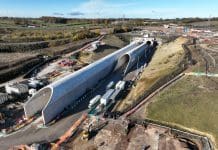Under proposals submitted to the government by Midlands Connect, there is a strong case for high speed trains to directly connect Birmingham, Nottingham, Leicester and Leeds via the East Midlands Hub station at Toton
Hourly high speed train services could operate between Birmingham Curzon Street and Nottingham, and between Bedford, Leicester and Leeds, vastly improving links between cities with historically poor rail connections.
The proposals would see the Nottingham-Birmingham journey time more than halved to just 33 minutes (currently 72 minutes) and the Leicester-Leeds journey time slashed from two hours to just 46 minutes.
Under current plans, passengers would have to use the existing network to travel to Toton before changing on to a high speed train, or vice versa. Midlands Connect’s plans make direct services possible using new conventional-compatible trains that can travel along both high speed and electrified tracks, allowing them to call at both new HS2 and existing stations.
The Nottingham-Birmingham service requires changes to a planned junction at the East Midlands Hub at Toton, which could be less expensive than the current junction which is due to be proposed as part of the Phase 2b hybrid Bill.
The capital cost of implementing the new high speed train services is estimated at £170m, including the Toton junction and infrastructure upgrades to the Midland Main Line to enable an extra hourly service from Bedford to Leeds, via Leicester.
The estimated economic benefit of the new services is at least £1.4bn, derived from journey time savings and the benefits to businesses of improving the economic relationship between towns and cities. More than half of these benefits will come to the East Midlands (51%, or £714m).
Both new connections bring huge potential benefits for businesses looking to reach new markets, employees seeking out new job opportunities, students deciding which university to study at, and those keen to explore new leisure and cultural destinations.
Building on the initial work undertaken to inform the East Midlands HS2 Growth Strategy published in 2017, a business case for both services has been submitted to the Department for Transport, which has formally commissioned HS2 Ltd to investigate the feasibility of the alternative junction.
It is acknowledged that the plans have the potential to reduce costs, improve connectivity and bring more flexibility to the network. The findings will also be submitted to the government’s HS2 Oakervee review.
The Bedford-Leeds service requires the electrification of the Midland Main Line north of Market Harborough, and the Birmingham-Nottingham service requires electrification west of Nottingham. Beyond these two new services, electrification of the MML will deliver significant financial and environmental benefits to the existing network.
Sir John Peace, chair of Midlands Connect and Midlands Engine, said: “Now we have more clarity over the costs and timescales of HS2, is it time that the true benefits of high speed rail are also fully understood to make sure the project goes ahead in its entirety.
“Our proposals are a genuine game-changer for connections between the East Midlands and West Midlands and on to the north of England, revolutionising the way regions do business with each other and demonstrating that HS2 will spread the economic benefits far beyond the cities with a dedicated station.
“We are working closely with HS2 Ltd and the Department for Transport to develop our compelling business cases, and submitting our findings to the HS2 Oakervee review.
“We are sending a strong message to the government that delivering HS2 in its entirety is absolutely essential to the future economic success of the whole of the UK.”
Richard Butler, CBI regional chairman, commented: “For too long connectivity within the Midlands has been beleaguered by congestion on roads and by slow and infrequent services by rail. Better connecting communities across the Midlands and to cities in the North will open up investment and employment opportunities, boosting local economies and people’s job prospects.
“Public transport needs to be convenient and accessible to all; enhancing existing HS2 plans to link more cities and towns will encourage more people to leave their cars at home – reducing congestion and the impact on the environment.”
Councillor Ian Ward, leader of Birmingham City Council, added: “We’ve been clear all along that HS2 is about rebalancing the UK economy and it’s clear that improving the links between Birmingham and Nottingham and between Leicester and Leeds would significantly boost the economies of the Midlands and the North.
“Birmingham is already benefitting from the prospect of HS2; other cities must not be ignored. Nottingham, Leicester, Derby, Sheffield, Leeds and other towns and cities of the Midlands and the North need the jobs and opportunities that come with high speed rail, enabling them to prosper in the decades ahead.”














